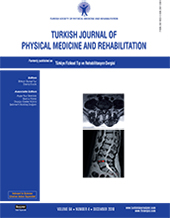Does a core stabilization exercise program have a role on shoulder rehabilitation? A comparative study in young females
2 Department of Orthopaedics and Traumatology, Koç University School of Medicine, İstanbul, Turkey
3 Koç University School of Medicine, İstanbul, Turkey DOI : 10.5606/tftrd.2018.1418 Objectives: This study aims to evaluate the effect of core stabilization exercises and to explore the immediate effect of core muscles-activated posture on shoulder maximal voluntary isometric contraction (MVIC) strength.
Patients and methods: Between November 2016 and January 2015, a total of 75 healthy female volunteers (mean age 25.36 years; range, 18 to 30 years) were included. Of these, 42 consecutive volunteers were assigned as the study group, while the remaining 33 volunteers were assigned as the control group. The study group completed a six-week core stabilization home-based exercise program. Two measurements were performed with six-week interval. A set of three repetitions for each shoulder side was performed by an electronic dynamometer under two conditions: core muscles relaxed and activated. Measurements were monitored real-time with a connected computer and recorded in Newton.
Results: The activation of core muscles during the measurement significantly decreased the MVIC values in both groups (p<0.05). The MVIC values significantly increased after home-based exercise program in both conditions (p<0.05).
Conclusion: Our study showed that six-week core stabilization exercise program had a significant positive effect on the shoulder MVIC strength. This result may support the use of core stabilization exercises in the early periods of shoulder rehabilitation when the shoulder muscle strengthening exercises are painful.
Keywords : Muscle strength dynamometer; rotator cuff; shoulder
















